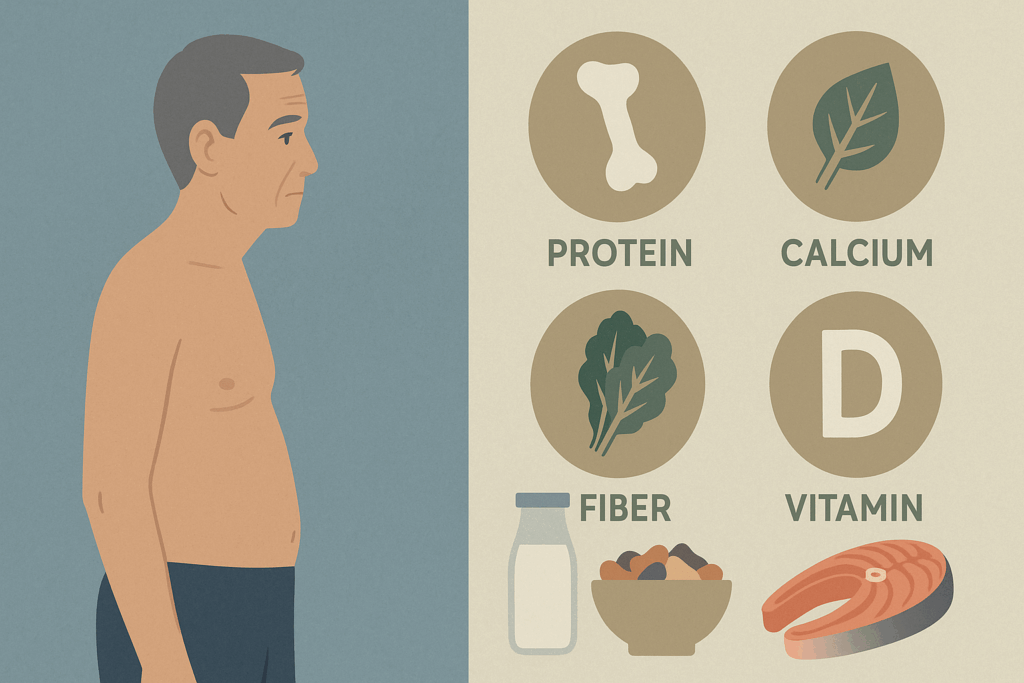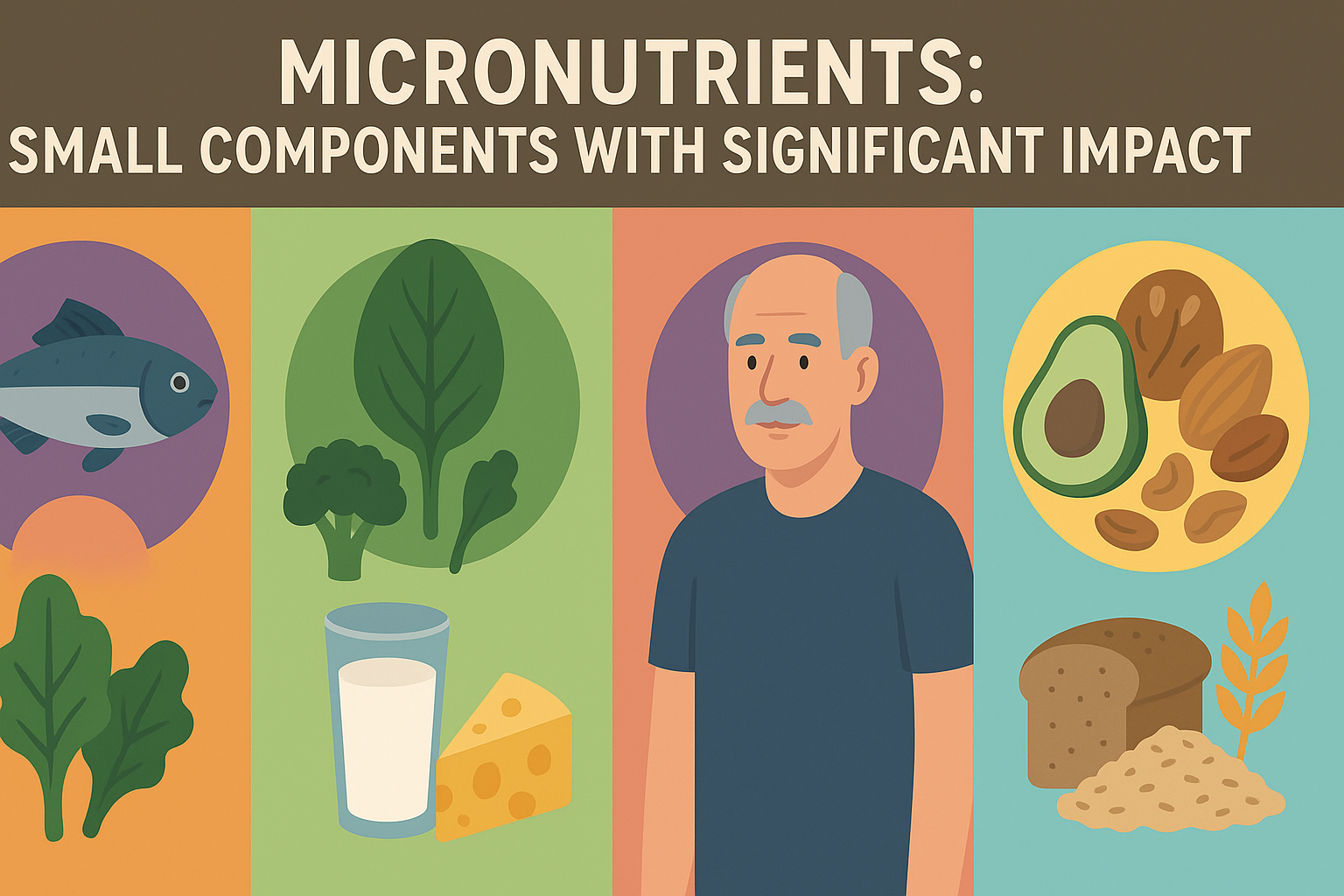Introduction: Embracing Nutritional Wisdom After 50
As men cross the threshold of 50, the pursuit of strength, vitality, and longevity becomes more than just a health goal—it transforms into a lifestyle imperative. Navigating this phase requires a nuanced understanding of the best diet for men over 50, one that supports muscle maintenance, hormonal balance, and overall well-being. This guide delves into the intricacies of nutrition tailored for men in their golden years, offering insights into dietary choices that promote sustained energy, mental clarity, and a robust physique.
You may also like: 10 Essential Tips on Choosing Healthy Food for Ladies to Boost Energy and Wellness

Understanding the Nutritional Needs of Men Over 50
The aging process brings about physiological changes that necessitate adjustments in dietary intake. Metabolic rates tend to decline, leading to potential weight gain if caloric intake isn’t moderated. Simultaneously, the risk of chronic conditions such as cardiovascular disease, type 2 diabetes, and osteoporosis increases. Therefore, a diet rich in essential nutrients becomes paramount. Key components include adequate protein to preserve muscle mass, calcium and vitamin D for bone health, and fiber to support digestive function. Incorporating a variety of fruits, vegetables, whole grains, lean proteins, and healthy fats can address these needs effectively.Fountain Life: Prioritize Your LongevityMale Excel

Protein: The Cornerstone of Muscle Maintenance
Protein plays a critical role in preserving lean muscle mass, which naturally diminishes with age. Ensuring sufficient protein intake can counteract sarcopenia, the age-related loss of muscle tissue. Sources such as lean meats, fish, dairy products, legumes, and nuts provide high-quality protein. Distributing protein consumption evenly throughout the day enhances muscle protein synthesis. Additionally, incorporating plant-based proteins can offer the added benefits of fiber and phytonutrients.Wikipedia+2over50magazine.com+2Health+2
Embracing Healthy Fats for Heart and Brain Health
Not all fats are created equal. Monounsaturated and polyunsaturated fats, found in foods like avocados, olive oil, and fatty fish, support cardiovascular health and cognitive function. Omega-3 fatty acids, in particular, have anti-inflammatory properties and are linked to reduced risk of heart disease. Limiting saturated and trans fats, commonly found in processed foods, is equally important to maintain optimal health. Balancing fat intake ensures that the body receives essential fatty acids without the adverse effects associated with unhealthy fats.

Carbohydrates: Choosing Quality Over Quantity
Carbohydrates serve as the body’s primary energy source, but the type and amount consumed can significantly impact health. Complex carbohydrates, such as whole grains, legumes, and vegetables, provide sustained energy and are rich in fiber, aiding in digestion and blood sugar regulation. Conversely, simple carbohydrates, often found in sugary snacks and beverages, can lead to energy spikes and crashes, contributing to weight gain and insulin resistance. Prioritizing complex carbs and moderating intake aligns with the best diet for men over 50.

Micronutrients: Small Components with Significant Impact
Micronutrients, including vitamins and minerals, play vital roles in various bodily functions. Vitamin D and calcium are crucial for bone health, while B vitamins support energy metabolism and neurological function. Magnesium contributes to muscle and nerve function, and antioxidants like vitamins C and E combat oxidative stress. A diverse diet rich in colorful fruits and vegetables, whole grains, and lean proteins typically provides these essential nutrients. However, supplementation may be necessary in cases of deficiency, under professional guidance.

Hydration: The Often Overlooked Essential
Adequate hydration is fundamental to overall health, influencing everything from joint lubrication to temperature regulation. As men age, the sensation of thirst may diminish, increasing the risk of dehydration. Consuming sufficient water throughout the day, along with hydrating foods like fruits and vegetables, supports bodily functions and can aid in weight management by promoting satiety. Limiting diuretics such as caffeine and alcohol further assists in maintaining hydration levels.
The Role of Fiber in Digestive and Cardiovascular Health
Fiber is essential for maintaining digestive health and regulating blood cholesterol levels. Soluble fiber, found in oats, beans, and certain fruits, helps lower LDL cholesterol, while insoluble fiber, present in whole grains and vegetables, promotes regular bowel movements. A diet high in fiber can also aid in weight management by increasing feelings of fullness. Incorporating a variety of fiber-rich foods aligns with the best diet for men over 50, supporting both digestive and heart health.
Antioxidants: Defending Against Cellular Aging
Antioxidants neutralize free radicals, unstable molecules that can damage cells and contribute to aging and chronic diseases. Foods rich in antioxidants, such as berries, dark leafy greens, nuts, and seeds, should be staples in the diet. These compounds support immune function, reduce inflammation, and may lower the risk of certain cancers. A colorful plate often indicates a variety of antioxidants, emphasizing the importance of dietary diversity.Wikipedia+1Gym Tips+1
Meal Timing and Frequency: Optimizing Metabolic Health
The timing and frequency of meals can influence metabolism and energy levels. Regular, balanced meals help maintain steady blood sugar levels, preventing energy dips and overeating. Some individuals may benefit from smaller, more frequent meals, while others may find success with intermittent fasting protocols. Personal preferences, lifestyle, and medical conditions should guide meal timing strategies, always aiming to support metabolic health and overall well-being.

Incorporating Physical Activity: Complementing Dietary Efforts
While diet plays a pivotal role in health, combining nutritional strategies with regular physical activity amplifies benefits. Strength training helps preserve muscle mass, aerobic exercises support cardiovascular health, and flexibility routines enhance mobility. Physical activity also aids in weight management and improves mental health. A holistic approach that integrates both diet and exercise is essential for men over 50 seeking to maintain vitality and longevity.
Frequently Asked Questions: Exploring the Best Diet for Men Over 50
1. Why does metabolism slow down after 50, and how should diet adapt?
As men age, their basal metabolic rate naturally decreases due to a combination of hormonal changes, reduced muscle mass, and less physical activity. Testosterone levels decline, leading to lower energy expenditure, and muscle atrophy begins to subtly impact overall calorie needs. The best diet for men over 50 should therefore emphasize protein-rich foods to support lean mass retention while lowering overall caloric intake. Incorporating more fiber from whole foods—such as oats, lentils, and leafy greens—can also aid digestion and improve metabolic efficiency. Strategic portion control and nutrient-dense meals can counteract these physiological shifts without triggering energy dips or nutrient deficiencies.
2. How can the best diet for men over 50 support cognitive function?
Beyond heart health and body composition, diet plays a crucial role in preserving cognitive sharpness. Omega-3 fatty acids from fatty fish like salmon and sardines, as well as walnuts and flaxseeds, are associated with reduced inflammation and improved memory. The best diet for men over 50 should also include antioxidants from berries, dark chocolate, and green tea to protect against oxidative stress in brain cells. Studies suggest that consistent intake of leafy greens—rich in vitamin K and folate—can slow cognitive decline. For those concerned about dementia or age-related memory loss, a Mediterranean-style male nutrition plan may be particularly protective due to its balance of healthy fats, whole grains, and plant-based nutrients.
3. What emotional and social factors influence diet adherence in older men?
Men over 50 often face social and psychological hurdles that younger individuals may not—retirement stress, loss of a spouse, or shifts in daily structure can undermine dietary discipline. Emotional eating may increase, especially when meals are consumed in isolation. Diet programs for men in this age group must address more than just macronutrient ratios; they must also incorporate strategies for emotional well-being and social engagement. Cooking classes, communal meal groups, or structured meal delivery systems can help reintroduce joy and routine into eating. Long-term adherence improves dramatically when diets for men feel purposeful, culturally relevant, and emotionally satisfying.
4. How do sleep and stress levels affect diet success in men over 50?
Sleep deprivation and chronic stress are two often-overlooked barriers to weight management. Cortisol—the primary stress hormone—can lead to increased abdominal fat storage and sugar cravings, while poor sleep disrupts hunger-regulating hormones like ghrelin and leptin. A successful male nutrition plan should not only account for calories and macros but also promote sleep hygiene practices and stress reduction techniques. Herbal teas, magnesium-rich foods like pumpkin seeds and dark leafy greens, and avoidance of heavy meals before bedtime can enhance sleep quality. Mindfulness practices like yoga and meditation, when paired with the best weight loss meals for men, create a holistic foundation for health.
5. Can plant-based diets meet the nutritional needs of men over 50?
Yes, with thoughtful planning, plant-based diets can fully meet the needs of aging men. The key lies in diversifying plant protein sources—lentils, tempeh, quinoa, and black beans—and ensuring adequate intake of nutrients like B12, iron, and omega-3s. Many plant-forward diet programs for men include fortified foods or supplements to close any nutritional gaps. This approach may also help reduce the risk of chronic diseases like hypertension and prostate issues. For those seeking the best diet for men over 50 with an ethical or environmental twist, plant-based plans can offer longevity benefits without compromising muscle maintenance or hormonal health.
6. What role do micronutrients play in diets for men over 50?
As men age, certain micronutrient needs increase due to reduced absorption and changing physiology. Vitamin D becomes essential for bone density, while magnesium supports heart rhythm and muscle function. Zinc plays a key role in immune defense and testosterone production, and B vitamins support energy metabolism. Unfortunately, standard Western diets often lack these essentials. The best weight loss meals for men should integrate these micronutrients through foods like spinach, almonds, sardines, fortified cereals, and mushrooms. Incorporating a variety of colors and textures into meals can naturally elevate micronutrient diversity and support age-related health needs.
7. Are intermittent fasting or time-restricted eating safe for men over 50?
When done mindfully, intermittent fasting (IF) and time-restricted eating (TRE) can be beneficial tools for older men looking to manage weight and improve metabolic flexibility. These approaches work by reducing insulin resistance, enhancing autophagy, and aligning eating with circadian rhythms. However, the best diet for men over 50 using IF should avoid extreme calorie restrictions, as this may trigger muscle loss. A 16:8 or 14:10 fasting window, combined with nutrient-dense meals during the eating period, is generally safe for healthy individuals. Consulting a healthcare provider before starting these strategies is crucial, especially for men with diabetes or cardiovascular conditions.
8. What are some overlooked but effective weight loss meals for men?
Many men over 50 underestimate the power of functional foods that blend satiety with metabolic support. For example, a bowl of lentil soup with turmeric and leafy greens offers fiber, protein, and anti-inflammatory benefits in one dish. A quinoa and roasted vegetable bowl topped with tahini sauce can provide complex carbs and healthy fats. Chia pudding with berries and cinnamon serves as a nutrient-packed breakfast or snack that supports stable blood sugar. These types of weight loss meals for men are often more effective than pre-packaged diet products because they support gut health, reduce cravings, and promote fullness without sacrificing flavor.
9. How can technology help sustain diet programs for men?
Apps and wearable devices now offer personalized insights that can enhance dietary adherence. Many tools allow users to track their meals, water intake, macronutrient ratios, and even stress levels. Smart scales, glucose monitors, and sleep trackers provide real-time feedback that informs more adaptive diet programs for men. Virtual coaching, recipe generators, and AI-driven meal planners can reduce the mental load associated with healthy eating. When integrated with the best diet for men over 50, these technologies can bridge the gap between intention and execution, providing data-backed motivation and habit reinforcement over time.
10. What are long-term success predictors in sustainable diets for men?
Consistency, variety, and adaptability are key predictors of long-term success. Diets for men should evolve with life changes—whether that means adjusting for travel, changing taste preferences, or shifting health goals. Sustainable eating patterns often include weekly planning, seasonal foods, and built-in flexibility that accommodates social eating and indulgences. The best weight loss meals for men are those that men enjoy preparing and sharing, not those that feel restrictive or monotonous. Ultimately, the most effective male nutrition plan is one that supports physical health while aligning with personal identity, emotional satisfaction, and evolving life circumstances.
Conclusion: Crafting a Sustainable Path to Health
Adopting the best diet for men over 50 involves more than temporary changes; it requires a commitment to sustainable, health-promoting habits. By focusing on nutrient-dense foods, adequate hydration, and regular physical activity, men can navigate the aging process with strength and vitality. Personalizing dietary choices to align with individual health needs and preferences ensures long-term adherence and success. Embracing this comprehensive approach lays the foundation for a fulfilling and healthy life beyond 50.
Further Reading:
The 8 Best Diets for Men at Every Age



